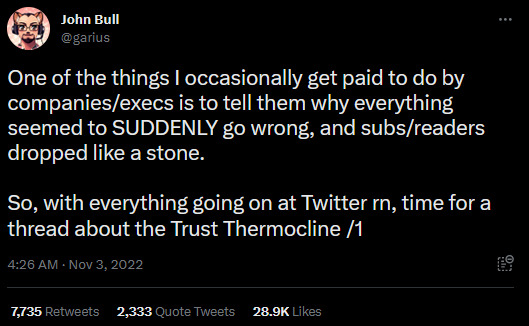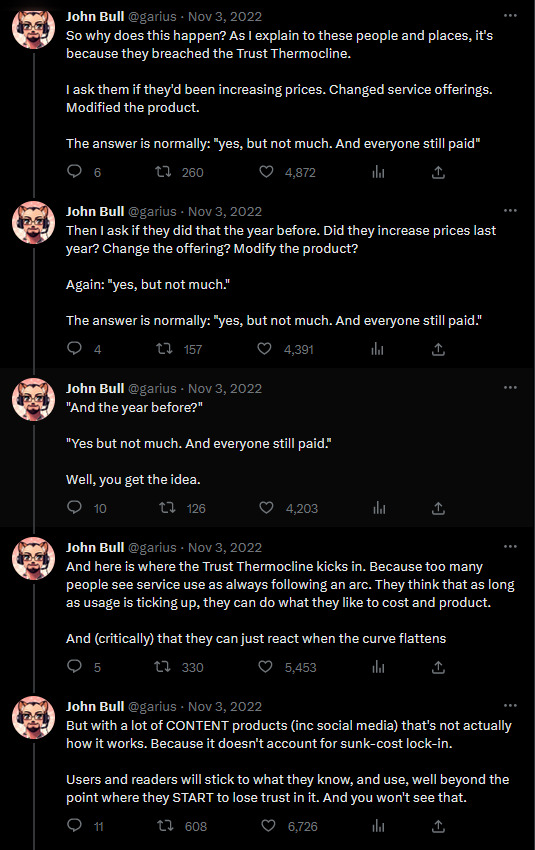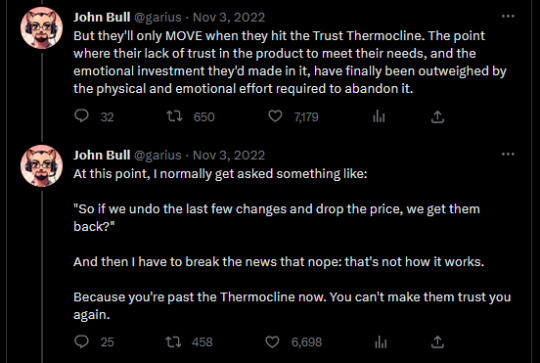Don't wanna be here? Send us removal request.
Text
Rewatching Treasure Planet (great movie, watch it) made realize something about the way that stories convey information to their audiences. There's been a lot of discussion on the overuse of plot twists and how many stories prioritise surprising their audience over telling decent stories. However, if you instead reveal the "twist" to the audience before it becomes known to the characters, you can build tension and stakes. Treasure Planet comes right out and tells you that Long John Silver is the main villain almost immediately after his introduction (And even before he's introduced we're warned about a cyborg, so you'd have to be pretty dense to not put 2 and 2 together and realize he's a bad guy). So when the audience watches him and Jim bond and grow closer, it builds tension for when Jim finds out and it highlights the tragedy of their friendship, because we all know it's not going to end well. Then, after the truth is revealed, stakes are created because we want the friendship between Jim and Silver to be repaired, because we know it was real, but we don't know if can be after what Silver's done. And all of this would have been lost if Silver's true nature had been a cheap plot twist. The tragedy would be completely overshadowed by the surprise and betrayal, and any investment in their relationship would have been built on the false impression that Silver was a good guy.
Another good example of this is Titanic. Even if you were somehow ignorant of the ship's sinking, the film makes sure you know that it sank with its framing device of Old Rose telling her story to people salvaging the Titanic's wreak. And Titanic's plot structure could only possibly work if you know the ship is going to sink. I'm not just talking about building tension, tragedy, and stakes for the characters like with the above example, I mean that if you didn't know that the Titanic was going down walking into the film, the abrupt shift from romance to suspense-disaster would be an increadibly tough pill to swallow. But it works because we expect it. You don't walk into a film called Titanic without expecting the damn boat to sink.
However, the sad thing about both of these examples, is that despite all the benefits that came from telling the audience these things ahead of time, I think the main reason the creators didn't make them plot twists was because they couldn't have. Treasure Island is the single most influential piece of pirate media out there, and you'd have to have been living under a rock for over a century to not know the Titanic sank. So, the writers had to work around the fact that these important turning points in the narratives were common knowledge, and they wound creating incredible stories as a consequence.
I want to see more of this style of writing in stories where the writers aren't forced to do it. We've clearly seen that you can tell some really damn good stories by giving information to the audience before the characters learn it, and I just wish more works would do that instead of trying to surprise people with shocking twists.
17K notes
·
View notes
Text
unavoidable that you will be the villain in someone else's story. You will be painted in an unfavorable light. You will be the irredeemable one. and all of this will happen despite how nice you might usually be or how kind or how respectful or how warm. and you will just have to move on.
85K notes
·
View notes
Photo




Really good Twitter thread originally about Elon Musk and Twitter, but also applies to Netflix and a lot of other corporations.
Full thread. Text transcription under cut.
Keep reading
70K notes
·
View notes
Text
every scifi writer: in 2025 the machines are smarter than anyone thinks they are
real-life 2025 horror: everyone thinks the machines are smarter than they are
7K notes
·
View notes
Text
my high school used to start at 7:30 and I lowkey think that was child abuse
#had to be out the door by 6 or risk missing the bus#whoever set the school time deserves to have a hornets nest dropped on them
32K notes
·
View notes
Photo

The Vision of Saint Hubert. Franz von Stuck, 1890
6K notes
·
View notes
Text
39K notes
·
View notes
Text

Ichi needs a long-range majik
24 notes
·
View notes
Text
Hideous Self Promotion
I've created a kofi! If you like my work and would like to see me do more of it, then I'd be so glad to receive a cup of coffee from you!
If you're interested in commissions, that is also the platform to contact me.
37 notes
·
View notes
Text
If we wanted to engage in nuance (lol, lmao) on the "are audiobooks reading" debate, we really do need to bring literacy, and especially blind literacy, into the conversation.
Because, yes, listening to a story and reading a story use mostly the same parts of the brain. Yes, listening to the audiobook counts as "having read" a book. Yes, oral storytelling has a long, glorious tradition and many cultures maintained their histories through oral history or oral + art history, having never developed a true written language, and their oral stories and histories are just as valid and rich as written literature.
We still can't call listening in the absence of reading "literacy."
The term literacy needs to stay restricted to the written word, to the ability to access and engage with written texts, because we need to be able to talk about illiteracy. We need to be able to identify when a society is failing to teach children to read, and if we start saying that listening to stories is literacy, we lose the ability to describe those systemic failures.
Blind folks have been knee-deep in this debate for a long time. Schools struggle to provide resources to teach students Braille and enforcing the teaching of Braille to low-vision and blind children is a constant uphill battle. A school tried to argue that one girl didn't need to learn Braille because she could read 96-point font. Go check what that is. The new prevalence of audiobooks and TTS is a huge threat to Braille literacy because it provides institutions with another excuse to not provide Braille education or Braille texts.
That matters. Braille-literate blind and low-vision people have a 90% employment rate. For those who don't know Braille, it's 30%. Braille literacy is linked to higher academic success in all fields.
Moving outside the world of Braille, literacy of any kind matters. Being able to read text has a massive impact on a person's ability to access information, education, and employment. Being able to talk about the inability to read text matters, because that's how we're able to hold systems accountable.
So, yes, audiobooks should count as reading. But, no, they should not count as literacy.
29K notes
·
View notes
Text
i know most leftists agree that everybody should have a right to food, water, shelter, and healthcare but i think a vitally important fifth pillar is privacy. people should not be compelled to be tracked, monitored, or to share personal space with others to access their other essential rights
47K notes
·
View notes
Text














Detective Comics #1100 - "Lost & Found" (2025)
written by Tom Taylor art by Mikel Janin
20K notes
·
View notes




